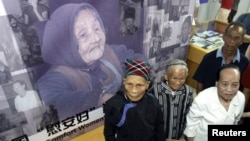Japan’s largest newspaper issued an apology Friday for having used the term “sex slave” and “other inappropriate expressions” in place of the euphemistic term “comfort women,” to describe up to 200,000 women who were forced to work in brothels patronized by Japanese troops during World War II.
In a statement, the conservative Yomiuri Shimbun newspaper cited 97 articles from 1992 to 2013 that used the terms in the English-language version of the paper.
“The Japan News apologizes for having used these misleading expressions and will add a note stating that they were inappropriate to all the articles in question in our database,” said a statement on the paper’s website.
The statement said the Japanese-language edition of the paper had only used the term “comfort women,” but that the “expression ‘comfort women’ was difficult to understand for non-Japanese who did not have knowledge of the subject.”
According to the Washington Post, a spokesman for the Yomiuri Shimbun said the apology was triggered by a retraction of a decades-old story from the paper’s more liberal rival, the Asahi Shimbun, that quoted a Japanese man who said he’d kidnapped Korean women and forced them to become prostitutes.
With the retraction, the Yomiuri accused Asahi of committing an “extremely grave” error, which had tarnished Japan's reputation, according to the New York Times.
In 1993, then Chief Cabinet Secretary Yohei Kono apologized for the use of comfort women from many countries, including Korea, China and the Philippines.
The conservative government of Prime Minister Shinzo Abe has worked to change the perception of Japan’s behavior during the war.
The move by the newspaper reflects the views of the Abe administration, according to a tweet by Koichi Nakano, a political scientist at Sophia University in Tokyo.
According to the New York Times, Tsuneo Watanabe, Yomiuri’s chairman, is a “close associate” and “firmly backs” Abe.
The move by the newspaper will likely stir anger among Japan’s neighbors, particularly Korea, which has long maintained Japan has yet to atone for its behavior during the war.





